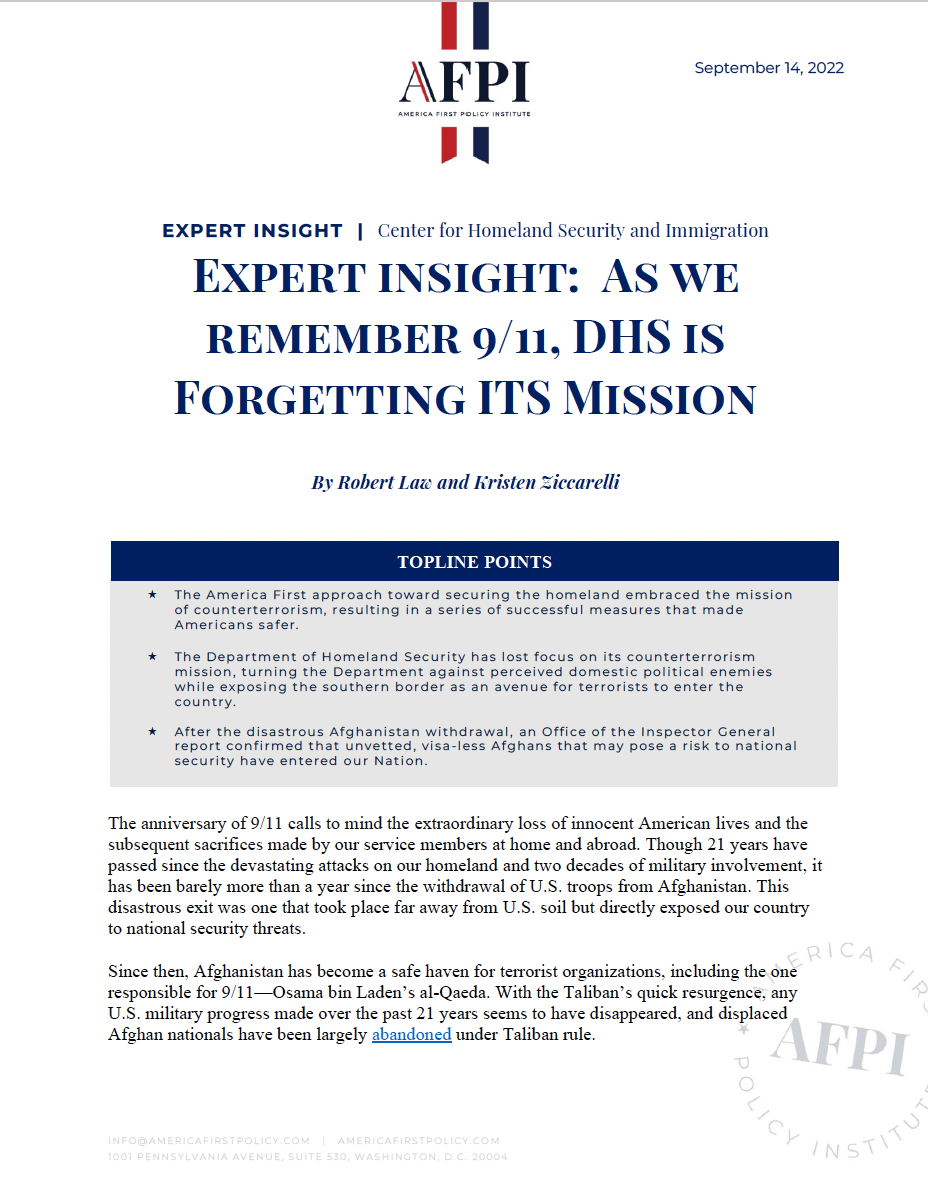Expert insight: As we remember 9/11, DHS is Forgetting ITS Mission
Key Takeaways
The America First approach toward securing the homeland embraced the mission of counterterrorism, resulting in a series of successful measures that made Americans safer.
The Department of Homeland Security has lost focus on its counterterrorism mission, turning the Department against perceived domestic political enemies while exposing the southern border as an avenue for terrorists to enter the country.
After the disastrous Afghanistan withdrawal, an Office of the Inspector General report confirmed that unvetted, visa-less Afghans that may pose a risk to national security have entered our Nation.
The anniversary of 9/11 calls to mind the extraordinary loss of innocent American lives and the subsequent sacrifices made by our service members at home and abroad. Though 21 years have passed since the devastating attacks on our homeland and two decades of military involvement, it has been barely more than a year since the withdrawal of U.S. troops from Afghanistan. This disastrous exit was one that took place far away from U.S. soil but directly exposed our country to national security threats.
Since then, Afghanistan has become a safe haven for terrorist organizations, including the one responsible for 9/11—Osama bin Laden’s al-Qaeda. With the Taliban’s quick resurgence, any U.S. military progress made over the past 21 years seems to have disappeared, and displaced Afghan nationals have been largely abandoned under Taliban rule.
The Biden Administration’s Department of Homeland Security (DHS) played a role in the chaotic withdrawal from Afghanistan by unlawfully transporting unvetted, visa-less Afghans into the Nation. This action cast aside our immigration laws and allowed otherwise inadmissible aliens into the country. A DHS Office of Inspector General (OIG) report made public on September 6, 2022, just days before the 21st anniversary of 9/11, confirms the alarming national security consequences of the Biden Administration’s mishandling of the Afghanistan withdrawal. The report found that “DHS may have admitted or paroled individuals into the United States who pose a risk to national security and the safety of local communities” and determined that neither the vetting process nor the record checks were conducted properly.
This series of events rings too familiar. It is the same siloed approach to vetting and intelligence that failed the American people on September 11, 2001, when the 9/11 Commission investigation determined that the intelligence community (IC) had the information to potentially forecast the attacks, but the lack of communication and intelligence sharing between agencies failed to prevent them from happening. The OIG report states, “According to CBP and FBI officials, IC vetting databases are founded on biographic data. However, we identified discrepancies with the CBP data used to vet Afghan evacuees against U.S. Government databases.”
Since its inception, the mission of DHS has centered around protecting the American homeland by securing the border and critical infrastructure, synthesizing intelligence from multiple sources, and putting more security officers in the field to stop terrorists.
The botched Afghanistan withdrawal not only jeopardizes the homeland security mission on its own but is an alarming indicator that the Biden Administration’s policy decisions have turned DHS toward a ‘September 10, 2001’ mindset. After the OIG report was released last week, the Biden Administration rejected the findings and said DHS is “proud” of how it handled the Afghanistan withdrawal, including allowing 79,000 visa-less Afghans into U.S. borders. This unprecedented neglect of the DHS mission is at odds with nearly all post-9/11 counterterrorism and national security policymaking.
The America First Policy Institute’s recently released issue brief entitled, 21 Years after 9/11, Has DHS lost its Mission?, details the Biden Administration’s diversion from former presidents’ whole-of-government approach to securing the homeland. This is an abandonment of a range of DHS responsibilities, including securing the southern border, following proper vetting procedures, ensuring a robust student visa system, and preventing known-and-suspected terrorists from entering the Nation.
Since the 9/11 attacks on our homeland occurred, the reorganization of the federal government has executed successful counterterrorism activities to stop plots against the U.S. and our strategic allies. These successes are attributable to the maturation and refinement of counterterrorism prevention skills and strategies over subsequent administrations. There have been failures, including the 2013 Boston Marathon bombing, 2016 Orlando nightclub shooting, and 2017 New York City subway bombing. Yet, overall, past administrations embraced the whole-of-government approach to counterterrorism and intelligence sharing that Congress envisioned when it created DHS. The 2018 National Strategy for Counterterrorism, written by the Office of the Director for National Intelligence, centered on this cooperative approach to pursue and isolate terrorists from the source and employ an aggressive pursuit against those that seek to violently undermine the American way of life. This approach led to greater security for the U.S., but the past few years have seen a radical departure.
As we remember all who lost their lives on 9/11 and continue to honor the service members who fight for our freedom today, we must never forget that the threats to our homeland can have devastating consequences. Our policymakers cannot lose focus on their mandate to secure our country and protect the American people.
